Unit3 Teenagers should be allowed to choose their own clothes教案(人教版九年级全册) (3)
九年级英语全册Unit3《Teenagersshouldbeallowedtochoosetheirownclothes》教案人教新目标版
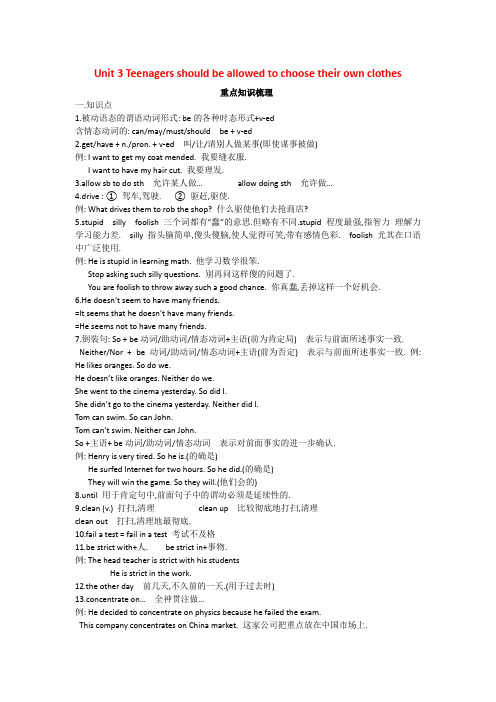
Unit 3 Teenagers should be allowed to choose their own clothes重点知识梳理一.知识点1.被动语态的谓语动词形式: be的各种时态形式+v-ed含情态动词的: can/may/must/should be + v-ed2.get/have + n./pron. + v-ed 叫/让/请别人做某事(即使谋事被做)例: I want to get my coat mended. 我要缝衣服.I want to have my hair cut. 我要理发.3.allow sb to do sth 允许某人做… allow doing sth 允许做…4.drive : ① 驾车,驾驶. ② 驱赶,驱使.例: What drives them to rob the shop? 什么驱使他们去抢商店?5.stupid silly foolish 三个词都有“蠢”的意思.但略有不同.stupid 程度最强,指智力理解力学习能力差. silly 指头脑简单,傻头傻脑,使人觉得可笑,带有感情色彩. foolish 尤其在口语中广泛使用.例: He is stupid in learning math. 他学习数学很笨.Stop asking such silly questions. 别再问这样傻的问题了.You are foolish to throw away such a good chance. 你真蠢,丢掉这样一个好机会.6.He doesn’t seem to have many friends.=It seems that he doesn’t have many friends.=He seems not to have many friends.7.倒装句: So + be动词/助动词/情态动词+主语(前为肯定局) 表示与前面所述事实一致. Neither/Nor + be动词/助动词/情态动词+主语(前为否定) 表示与前面所述事实一致. 例: He likes oranges. So do we.He doesn’t like oranges. Neither do we.She went to the cinema yesterday. So did I.She didn’t go to the cinema yesterday. Neither did I.Tom can swim. So can John.Tom can’t swim. Neither can John.So +主语+ be动词/助动词/情态动词表示对前面事实的进一步确认.例: Henry is very tired. So he is.(的确是)He surfed Internet for two hours. So he did.(的确是)They will win the game. So they will.(他们会的)8.until 用于肯定句中,前面句子中的谓动必须是延续性的.9.clean (v.) 打扫,清理clean up 比较彻底地打扫,清理clean out 打扫,清理地最彻底.10.fail a test = fail in a test 考试不及格11.be strict with+人. be strict in+事物.例: The head teacher is strict with his studentsHe is strict in the work.12.the other day 前几天,不久前的一天.(用于过去时)13.concentrate on… 全神贯注做…例: He decided to concentrate on physics because he failed the exam.This company concentrates on China market. 这家公司把重点放在中国市场上.14. more…than…①与其说…不如说…; 比…更…例: The man is more stupid than nervous.与其说那人紧张,倒不如说他愚蠢.②在这一结构中,more做adj. 修饰名词,表示“比…多”例:I have more books than you. 我的书比你的多.15.volunteer ① n. 自愿者. ② v. volunteer to do sth. 自愿做…例: We all volunteered to help in the old people’s home.我们都志愿到敬老院帮忙.16.chance 指侥幸的,偶尔的机会,还可表示“可能性”opportunity 指有利的时机,良机. 二者有时可以互换.Have an opportunity to do sth 有做…的机会.Don’t be too frustrated. You’ll have another opportunity to go to college next year. 别太沮丧了,你还有上大学的机会.17.experience : ①可数名词“经历,体验” 例: Please tell us something about your experiences.②不可数名词“经验” 例: He is a man of rich experience.③动词“经历” 例: She experienced lots of suffering.18. off 不工作,不上班,不上学,不值班.例: I think I’ll take the afternoon off. 我想下午歇班.She is off today. 她今天休息.I have three days off next week. 下周我有三天假.They haven’t had a day off since last week. 从上周来,他们没休息过一天.19. reply 与answer 两者有时可通用. reply比answer正式,一般指经过思考的.有针对性的,详细的回答,往往与to连用.answer是一般用语,可直接带宾语.另外answer还有“应答”之意.如answer the door/telephone20. get in the way (of)... 妨碍...例: He never gets in others’ way. 他从不妨碍别人.The bikes over there will get in the way of others. 自行车放在那里会妨碍别人的.21. success (n.) successful (adj.) succeed (v.)22. do does did 用在另一个动词前表示强调.例: He does speak well. 他真的讲的很好. Do be quiet. 务必安静.She did do her homework yesterday. 她昨天确实写作业了.23. in the end = finally = at last 最后.24. importance (n.) important (adj.)25. be serious about 对…热忠/极感兴趣.例: I’m serious about the problem.To tell you the truth, I’m not serious about math at all.26. only 处于句首,并后跟状语时,全句需要倒装.例: Only then did he understand it. 只有到那时,他才明白.Only in this way can we learn English well. 只有这样我们才能把英语学好.Only when she came home, did he learn the news. 当她到家时,他才得知了这消息.27. care about 关心,在乎,在意.例: No one cares about others nowadays. 现在没人关心别人.I don’t care about what he does. 我并不在意他干什么.28. clothes 统指身上穿的各种服装,包括上衣,裤子,内衣等,做主语,谓语动词按复数处理. clothing 不可数名词,是服装的总称,包括各种衣服,帽子,鞋袜等.做主语谓动按单三处理. cloth 布料.二.短语1. be allowed to do sth被允许干… allow sb to do sth 允许某人干…allow doing sth 允许干…2. sixteen-year-olds = sixteen-year-old boys and girls 16岁的孩子3. part-time jobs 兼职工作4. a driver’s license 驾照5. on weekends 在周末6. at that age 在那个年龄段7. on school nights 在上学期间的每个晚上8. stay up 熬夜9. clean up (相当与及物动词) 清扫10. fail (in) a test 考试不及格11. take the test 参加考试12. the other day 前几天13. all my classmates 我所有的同学14. concentrate on 全神贯注于15. be good for 对…有益16. in groups 成群的,按组的17. get noisy 吵闹(系表结构) 18. learn from 向某人学习19. at present 目前,现在20. have an opportunity to do sth 有做…的机会21.English-English dictionary 英英词典22. at least 至少23.eight hours’ sleep a night 每晚8小时的睡眠24. an old people’s home 敬老院25. take time to do sth 花费时间干…26. primary schools 小学27. have…off 放假,休息28. reply to 回答,答复29. get in the way of 妨碍30. a professional athlete 职业运动员31. achieve one’s dreams 实现梦想32. think about 思考,考虑33. in the end 最后,终于34. be serious about 对…热忠/极感兴趣35. spend…on + n. spend …(in) + v-ing 在…上花费时间/金钱36. care about 关心,担心,在乎37. agree with 同意…三.句子1. I don’t think twelve-year-olds should be allowed to get their ears pierced.我认为不应该允许12岁的孩子穿耳孔.2.They talk instead of doing homework. 他们聊天而不是做作业.3.He is allowed to stay up until 11:00 pm. 允许他们熬到晚上11点.4.We should be allowed to take time to do things like that more often.我们应该被允许更加经常的花些时间多做这类事情.5.What school rules do you think should be changed?你认为学校的哪些制度应该改一改了?6.The two pairs of jeans both look good on me. 这两条牛仔裤穿在我身上都适合.7.The classroom is a real mess. 教室太脏了.8.Should I be allowed to make my own decisions?9.Only then will I have a chance of achieving my dream. 只有这样我才能实现我的梦想.10.They should be allowed to practice their hobbies as much as they want.应该允许他们对业余爱好想练多长时间就练多长时间.。
九年级英语全册 Unit3 Teenagers should be allowed t
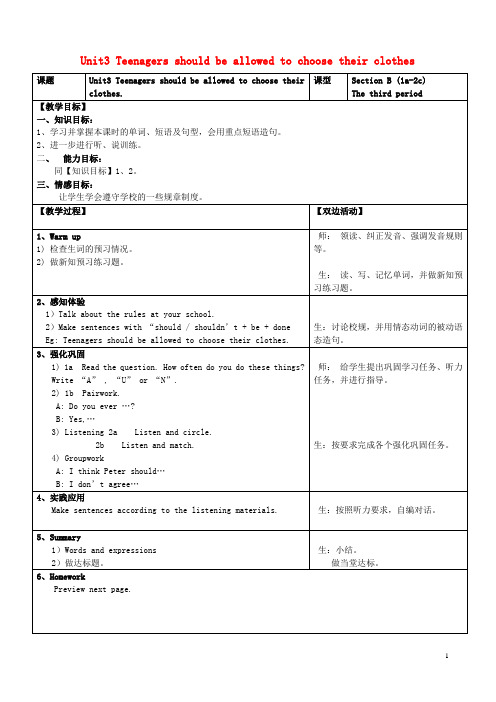
1 Unit3 Teenagers should be allowed to choose their clothes 课题 Unit3 Teenagers should be allowed to choose their clothes. 课型 Section B (1a-2c) The third period 【教学目标】 一、知识目标: 1、学习并掌握本课时的单词、短语及句型,会用重点短语造句。 2、进一步进行听、说训练。 二、 能力目标: 同【知识目标】1、2。 三、情感目标: 让学生学会遵守学校的一些规章制度。 【教学过程】 【双边活动】
1、Warm up 1) 检查生词的预习情况。 2) 做新知预习练习题。 师: 领读、纠正发音、强调发音规则等。
生: 读、写、记忆单词,并做新知预习练习题。 2、感知体验 1)Talk about the rules at your school. 2)Make sentences with “should / shouldn’t + be + done Eg: Teenagers should be allowed to choose their clothes.
生:讨论校规,并用情态动词的被动语态造句。 3、强化巩固 1) 1a Read the question. How often do you do these things? Write “A” , “U” or “N”. 2) 1b Pairwork. A: Do you ever …? B: Yes,… 3) Listening 2a Listen and circle. 2b Listen and match. 4) Groupwork A: I think Peter should… B: I don’t agree… 师: 给学生提出巩固学习任务、听力任务,并进行指导。
unit 3 Teenagers should be allowed to choose their own clothes教案
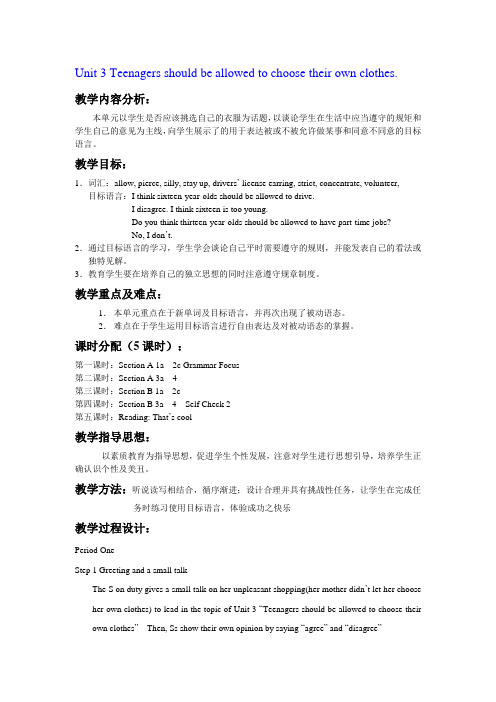
Unit 3 Teenagers should be allowed to choose their own clothes.教学内容分析:本单元以学生是否应该挑选自己的衣服为话题,以谈论学生在生活中应当遵守的规矩和学生自己的意见为主线,向学生展示了的用于表达被或不被允许做某事和同意不同意的目标语言。
教学目标:1.词汇:allow, pierce, silly, stay up, drivers’ license earring, strict, concentrate, volunteer, 目标语言:I think sixteen-year-olds should be allowed to drive.I disagree. I think sixteen is too young.Do you think thirteen-year-olds should be allowed to have part-time jobs?No, I don’t.2.通过目标语言的学习,学生学会谈论自己平时需要遵守的规则,并能发表自己的看法或独特见解。
3.教育学生要在培养自己的独立思想的同时注意遵守规章制度。
教学重点及难点:1.本单元重点在于新单词及目标语言,并再次出现了被动语态。
2.难点在于学生运用目标语言进行自由表达及对被动语态的掌握。
课时分配(5课时):第一课时:Section A 1a---2c Grammar Focus第二课时:Section A 3a---4第三课时:Section B 1a---2c第四课时:Section B 3a---4 Self Check 2第五课时:Reading: That’s cool教学指导思想:以素质教育为指导思想,促进学生个性发展,注意对学生进行思想引导,培养学生正确认识个性及美丑。
教学方法:听说读写相结合,循序渐进;设计合理并具有挑战性任务,让学生在完成任务时练习使用目标语言,体验成功之快乐教学过程设计:Period OneStep 1 Greeting and a small talkThe S on duty gives a small talk on her unpleasant shopping(her mother didn’t let her choose her own clothes) to lead in the topic of Unit 3 “Teenagers should be allowed to choose their own clothes”Then, Ss show their own opinion by saying “agree” and “disagree”Step 2 Do you agree or disagree1a Read the statements in the textbook. Circle A or DStep 3 Pair work 1cGet students to tell out their “agrees”and “disagrees”,as well as their reasons, to their partners. T moves around to give help if necessary.Step 4 Listening practice1b Get Ss to look at the picture and tell them they are going to hear a conversation between Anna and her mother. Listen and circle T of F (for the first time, Ss only listen.) Then check the answers: F, F, T2a-2b Do the same with them as 1bStep 5 Pairwork 2cFirst get Ss to list out teenagers should and should not be allowed to do. Then discuss their lists with their partners using the short conversation in the right box.Step 6 Task1:Get Ss to list out what they are and are not allowed to do and make comments about them.(to get Ss practice talking about their real experience and feelings with the target language) Step 7 Grammar focusGet Ss first to read out the statements and then give out their own opinions to replace the statements in the right column.Step 8 Summary and homework:What rules do you have at home? Make a list of them.Period TwoStep 1 GreetingGreet the class and check the homeworkStep 2 A duty reportThe S on duty gives a report on the rules in his home and lead in 3a “Sun Fei’s and Wu Yu’s rules”Step 3 ReadingSs read the conversation and write the two girls’ rules in the chart.Check the answers.Get Ss to read after the tape and then read aloud by themselves.Then, T explains the language points.Step 4 Pairwork 3bRole play. Use the information in chart to practice with the conversation in 3a covered.They can look at the sample conversation in the right box.Step 5 Task 2 “Who’s the best reporter?”Make a survey by asking any 5 students the questions in the chart in activity 4. Then give out a report about it. See who is the best reporter? And the best reporter will get a nice ball-pen. Step 6 Summary and homework:Write out the report in your exercise-books.Period ThreeStep 1 Greeting and a duty reportThe S gives a duty report talking about his experience of being late for school. Lead in the question “Do you ever get to school late? How often do you get to school late? Always, usually, sometimes, or never?Step 2 1a Get Ss to finish writing.Step 3 Pair work 1bGet Ss to talk about their answers with their partners using the sample conversation in the box on the right.Step 4 Listening practice2a Lead-in: What will happen if you get to school late? What about Peter? Let’s listen to a conversation between Peter and his father. Get Ss to finish 2a (As usual, for the first time, Ss only listen.) Check the answers.2b Listen again, match these sentences parts. Check the answers.Step 5 Group work 2cSs discuss the statements with their group members to practice oral English.Step 6 Task 3:A debateChoose one statement (No.3 Parents should not be too strict with teenagers.) as the topic for them to debate. Those who agree sit on one side, those who disagree sit on the other side.Before starting, each group have 2 minutes to get prepared. See which group is thewinner.While debating, Ss should write down the opinions they hear for their homework. Step 7 Summary and homeworkWrite an article about your own opinions to the topic debated in class.Period FourStep 1 GreetingGreet the class as usual and check the homework. Get two students to read out their articles to the class.Step 2 ReadingLeading-in: Everyone of you has your own thought. Let’s read an article written by a teenagers like you. While reading, please try to find out the answers to the questions below.Check the answers.T plays the tape for Ss to listen and repeat. Then get them to read it out loudly.T explains some language points.Step 3 Pair work 3bRole play. Use the information in 3a to have a conversation like the sample conversation in the box.Step 4 Task 4 The best opinion“What school rules do you think should be changed in our school?” Get Ss to discuss with their partners and then write down what both of them think should be changed on the paper given by T. Later, discuss those statements on the paper with the whole class and tell them to give the best one to the headmaster as good advice.Step 5 Task 5Suppose: you and your partner are starting a new Saturday English club. Discuss with him.Make a list of rules about what should and should not be allowed.Step 6 Writing practiceSelf Check Ex.2 get Ss to read the article and then practice writing a letter using the target language.Step 7 Summary and homeworkFinish Ex.1 in Self Check.Period FiveReading---That’s cool.Step 1 Warming-upAsk: What does the word “cool” mean to you? Give some examples. Ss talk about their own opinions freely.Step 2 While-readingGo through the reading and match the people with their opinions in 2 on page 24 and complete the sentences in 4 on page 25.Step 3 Deep comprehensionSs read the article more carefully. Try to guess the meanings of the new words. And match the words and expressions with their meanings in 3 on page 25. Then get Ss to make sentences with them.Step 4 Group workGet Ss to finish the group work in 5 on page 25 by asking their group members.Step 5 Summary and homeworkWrite a report about what your classmates think about “cool”.。
九年级英语全册 Unit3 Teenagers should be allowed t
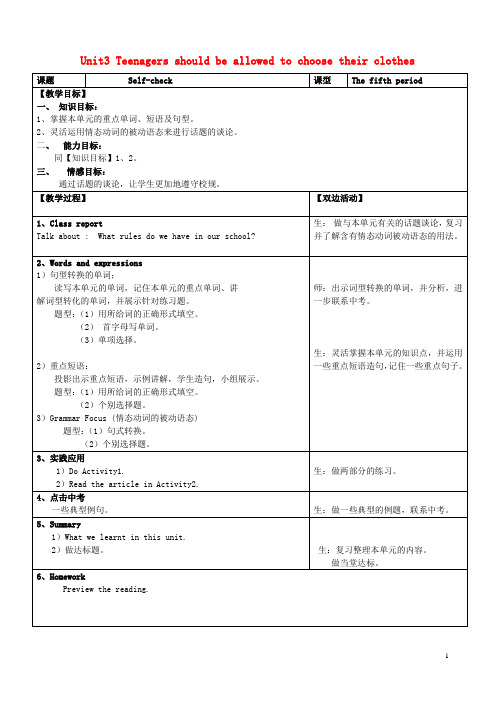
(2)个别选择题。
师:出示词型转换的单词,并分析,进一步联系中考。
生:灵活掌握本单元的知识点,并运用一些重点短语造句,记住一些重点句子。
3、实践应用
1)Do Activity1.
2)Read the article in Activity2.
生:做两部分的练习。
4、点击中考
一些典型例句。
1词型转化的单词,并展示针对练习题。
题型:(1)用所给词的正确形式填空。
(2) 首字母写单词。
(3)单项选择。
2)重点短语:
投影出示重点短语,示例讲解,学生造句,小组展示。
题型:(1)用所给词的正确形式填空。
(2)个别选择题。
3)Grammar Focus (情态动词的被动语态)
生:做一些典型的例题,联系中考。
5、Summary
1)What we learnt in this unit.
2)做达标题。
生:复习整理本单元的内容。
做当堂达标。
6、Homework
Preview the reading.
【教后反思】
本单元的话题是关于情态动词的被动语态,很多学生因为已经学习了很多关于被动语态的知识,所以本单元的学习、复习效果都不错。
同【知识目标】1、2。
三、情感目标:
通过话题的谈论,让学生更加地遵守校规。
【教学过程】
【双边活动】
1、Class report
Talk about : What rules do we have in our school?
生: 做与本单元有关的话题谈论,复习并了解含有情态动词被动语态的用法。
2、Words and expressions
unit3 teenagers should be allowed to choose their own clothes 教案
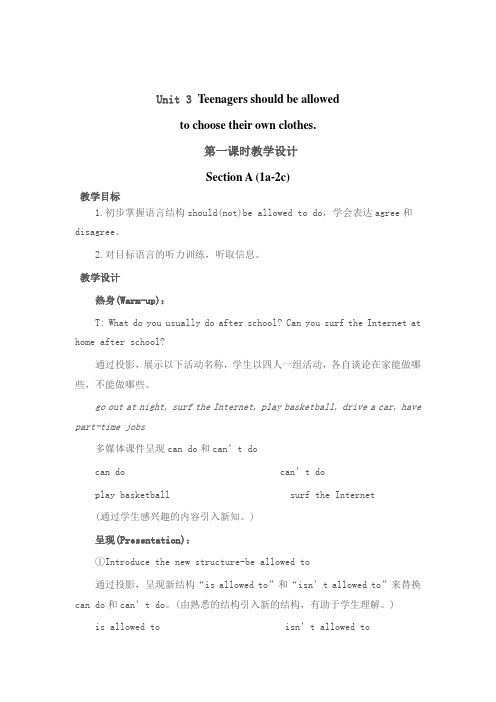
Unit 3 Teenagers should be allowedto choose their own clothes.第一课时教学设计Section A (1a-2c)教学目标1.初步掌握语言结构should(not)be allowed to do,学会表达agree和disagree。
2.对目标语言的听力训练,听取信息。
教学设计热身(Warm-up):T: What do you usually do after school? Can you surf the Internet at home after school?通过投影,展示以下活动名称,学生以四人一组活动,各自谈论在家能做哪些,不能做哪些。
go out at night, surf the Internet, play basketball, drive a car, have part-time jobs多媒体课件呈现can do和can’t docan do can’t doplay basketball surf the Internet(通过学生感兴趣的内容引入新知。
)呈现(Presentation):①Introduce the new structure-be allowed to通过投影,呈现新结构“is allowed to”和“isn’t allowed to”来替换can do和can’t do。
(由熟悉的结构引入新的结构,有助于学生理解。
)is allow ed to isn’t allowed toplay basketball surf the Internet … …Say, Nicky can play basketball at home, that means he is allowed to play basketball at home. (板书带有is allowed to结构的句子。
Teenagers should be allowed to choose their own clothes教学案〔优秀篇〕
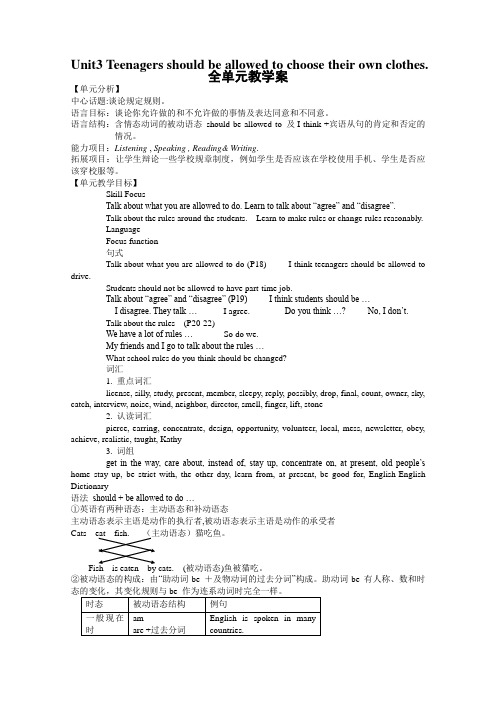
Unit3 Teenagers should be allowed to choose their own clothes.全单元教学案【单元分析】中心话题:谈论规定规则。
语言目标:谈论你允许做的和不允许做的事情及表达同意和不同意。
语言结构:含情态动词的被动语态should be allowed to 及I think +宾语从句的肯定和否定的情况。
能力项目:Listening , Speaking , Reading& Writing.拓展项目:让学生辩论一些学校规章制度,例如学生是否应该在学校使用手机、学生是否应该穿校服等。
【单元教学目标】Skill FocusTalk about what you are allowed to do. Learn to talk about “agree” and “disagree”.Talk about the rules around the students. Learn to make rules or change rules reasonably.LanguageFocus function句式Talk about what you are allowed to do (P18) I think teenagers should be allowed to drive.Students should not be allowed to have part-time job.Talk about “agree” and “disagree” (P19)I think students should be …I disagree. They talk …I agree. Do you think …?No, I don’t.Talk about the rules (P20-22)We have a lot of rules …So do we.My friends and I go to talk about the rules …What school rules do you think should be changed?词汇1. 重点词汇license, silly, study, present, member, sleepy, reply, possibly, drop, final, count, owner, sky, catch, interview, noise, wind, neighbor, director, smell, finger, lift, stone2. 认读词汇pierce, earring, concentrate, design, opportunity, volunteer, local, mess, newsletter, obey, achieve, realistic, taught, Kathy3. 词组get in the way, care about, instead of, stay up, concentrate on, at present, old people’s home stay up, be strict with, the other day, learn from, at present, be good for, English-English Dictionary语法should + be allowed to do …①英语有两种语态:主动语态和补动语态主动语态表示主语是动作的执行者,被动语态表示主语是动作的承受者Cats eat fish. (主动语态)猫吃鱼。
Unit 3 Teenagers should be allowed to choose their own clothes. 36 九年级英语教案
主备人 使用人 年级 授课
方式 新授 序号 13
课题 Unit 3 Teenagers should be allowed to choose their own clothes. 3/6
教 学 目 标
知识 技能
1、 Key Vocabulary stay up 2、 Target Language What rules do you have at home? Well, I'm not allowed to go out on school nights. How about you? I'm not allowed to go out on school nights either. But I can study at a friend's house.
过程 方法 According to designing some tasks, train students'
integrating skills.
情感 态度
Students may think parents should allow them
more freedom. In fact, they are weak in telling the right from wrong. So accept parents' advice.
教学重点 1.Talk about what oneself is or isn't allowed to do using the target language. 2.Ask for what someone is or isn't allowed to do using the target language. 教学难点 Train students' integrating skills by task-based activities. 教学内容及教师活动 学生活动 设计意图 Step 1 Revision Play a game to review the structure be or be not allowed to. Divide the class into groups. Each group is asked to make a list of
Unit 3 Teenagers should be allowed to choose their own clothes. 46 九年级英语教案
I think Peter should be allowed to take the test later.
I don't agree.
I think the school has to have rules.
过程
方法
According to designing some tasks to train students' listening skill and students' ability to talk about agreement and disagreement.
Ask three students to read the sample conversation to the class, completing the sentences.
Divide the class into groups of four.
As the groups work together, walk around the room offering help as needed. Ask some groups to say a few lines of their conversations to the class.
Ask several pairs to share their conversations with the class.
III.2a
This activity provides practice in understanding the target language in spoken conversation.
.
Listen and look.
Discuss the statements with their group.
- 1、下载文档前请自行甄别文档内容的完整性,平台不提供额外的编辑、内容补充、找答案等附加服务。
- 2、"仅部分预览"的文档,不可在线预览部分如存在完整性等问题,可反馈申请退款(可完整预览的文档不适用该条件!)。
- 3、如文档侵犯您的权益,请联系客服反馈,我们会尽快为您处理(人工客服工作时间:9:00-18:30)。
Unit 3 教案1 Part 1: Teaching design (第一部分:教学设计) 1.Structures: should ﹢ be allowed to
2.Target language: I think sixteen-year-olds should be allowed to drive. I disagree. I think sixteen is too young. Do you think thirteen-year-olds should be allowed to have part-time jobs? No, I don’t.
3.Vocabulary: allow, pierce, silly, stay up, drive, driver’s license,
Do you think„? I agree. I disagree. I don’t agree.
4.Learning strategies: Reflecting Transforming information
Section A 1.Goals ●To learn to use should ﹢ be allowed to ●To listen and speak about school life
2.Procedures
Warming up by learning new words To start with, let’s first go to page 147 to go over the vocabulary for this unit. Read to the tape and try to learn off them by heart. Warming up by learning about “should ﹢ be allowed to” We shall first learn to use the structures: “should ﹢ be allowed to”. It is actually part of the passive uses of English. Tense Subject Auxiliary Past Participle Singular Plural Present The car/cars is are designed. Present perfect The car/cars has been have been designed. Past The car/cars was were designed. Past perfect The car/cars had been had been designed. Future The car/cars will be will be designed. Future perfect The car/cars will have been will have been designed. Present progressive The car/cars is being are being designed. Past progressive The car/cars was being were being designed. “should ﹢ be allowed to” can be used like this: He should be allowed to come. Animals should be allowed to live in the forest. Children should be allowed to watch TV at weekends.
1a Reading and circling
For practice of the “should ﹢ be allowed to” read the statements in the box on page 18 and circle A for agree or D disagree.
1b Listening and circling
Listen and circle “T” for true or “F” for false beside the statements in the box on page 18. Tapescript
Woman:So, what are you doing this afternoon, Anna? Girl:I’m going to the mall with John. He just got his driver’s license. Woman:I’m sorry. You can’t go with John. I don’t think sixteen-year-olds should be allowed to drive. They aren’t serious enough at that age. Girl:But I have to go to the mall. Gaby’s getting her ears pierced and I want to watch. Woman:I don’t think sixteen-year-olds should be allowed to get their ears pierced. They might be sorry later. Girl:I agree, but it’s fun to watch. Is it OK if we take the bus? Woman:Well, I guess so. Girl:Great! I want to buy a new blouse at the mall, too. Woman:What kind are you going to buy? Maybe I should go with you. Girl:Aw, Mom. I’m not a child. I think teenagers should be allowed to choose their own clothes. Woman:Well, I just want to be sure you get something nice. Now try to copy the expressions from the listening tapescript on the blackboard into your notebook. go to the mall with„, get one’s driver’s license, go with„, allow„ to drive, be not serious enough, at that age, get one’s ears pierced, be allowed to get one’s ears pierced, be sorry later, it’s fun to watch, it is OK if„, take the bus, guess so, buy a new blouse at the mall, go with„, should be allowed to choose one’s own clothes, get something nice
1c Doing pairwork
In pairs look at the statements in activity 1a and make conversation. You may use the phrases in the box on page 18 A: I think teenagers should be allowed to go out with their friends. B: I agree. They are old enough. A: I think teenagers should be allowed to go to the mall with their classmates. A: I think teenagers should be allowed to get their driver’s license. A: I think teenagers should be allowed to drive. A: I think teenagers should be allowed to get their ears pierced. A:I think teenagers should be allowed to watch TV at weekends. A: I think teenagers should be allowed to take the school bus. A: I think teenagers should be allowed to buy a new blouse at the mall A: I think teenagers should be allowed to choose their own clothes. B: I agree. They are old/ clever/ strong/ bright/ serious/ kind/ careful/ lucky/ enough.
2a Listening and checking Next we are going to listen and check on page 19 what Kathy thinks. You may circle “Agree”, “Disagree”, or “Doesn’t know” to show what Molly thinks.
Tapescript
Molly: Larry is working late again tonight, Kathy. Kathy: I know, Molly. I don’t think sixteen-year-olds should be allowed to work at night. Young people need to sleep. Molly: I disagree with you. Teenage boys never get tired. Kathy: Well, maybe. But Larry shouldn’t work every night. Molly: Oh, I agree. He needs time to do homework. Kathy: You know, Molly„ he should really cut his hair. Molly: Oh, I disagree. I kind of like it. It looks cool! Kathy: You know what worries me—Larry doesn’t seem to have many friends. Molly: Yeah, I know. I think he shouldn’t work on weekends. Kathy: Oh I agree, Molly. He needs to spend time with friends. Molly: Like you and me? Kathy: Maybe.
